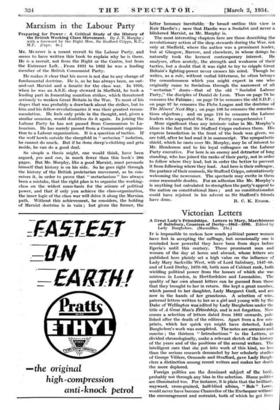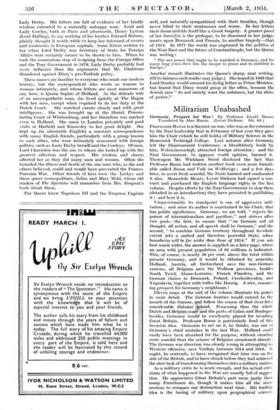Victorian Letters
A Great Lady's Friendships. Letters to Mary, Marchioness of Salisbury, Countess of Derby-1862-1890. Edited by Lady Burghclere. (Macmillan. 21s.) IT is impossible to reckon how much political power women have lost in accepting the suffrage, but occasionally one is reminded how powerful they have been from days before Egeria's until this century. Those prominent men and women of the day at home and abroad, whose letters are published here plainly set a high value on the influence of -Lady Mary Sackville West, wife of Lord Salisbury, 1847-68, and of Lord Derby, 1870-93, both men of Cabinet rank, both wielding political power from the houses of which she was mistress in London, in Hertfordshire and Lancashire. The quality of her own absent letters can be guessed from those that they brought to her in return. She kept a great number, which passed to her daughter, Lady Margaret Cecil, and are now in the hands of her grandsons. A selection of wise, paternal letters written to her as a girl and young wife by the Duke of Wellington was edited by Lady Burghclere under the title of A Great Mar5i Iiiitendship, and is not forgotten. Now comes a selection of letters dated from 1862 onwards, pub- lished after the death of the editress. Apart from a few mis- prints, which her quick eye might have detected, Lady Burghclere's work was completed. The notes are accurate and concise ; the thirteen " Introductions " to the Letters, - as divided chronologically, make a relevant sketch of the history of the years and of the positions of the several writers. The intelligent care that she put into work of this kind, no less than the serious research demanded by her scholarly studies of George Villiers, Ormonde and Strafford, gave Lady Burgh- clere a distinction among recent writers and makes her death the more deplored.
Foreign politics are the dominant subject of the book, probably not through any bias in_the selection. Home politics are illuminated too. For instance, it is plain that the brilliant, wayward, cross-grained, half-blind albino, " Bob " Lowe, would never have become Chancellor of the Exchequer without the encouragement and restraint, both of which he got from Lady Derby. - His letters are full of evidence of her kindly wisdom extended to a naturally unhappy man. Lord and Lady Cowley, bath in Paris and afterwards, Henry Lytton (Lord Dalling), to say nothing of his brother Edward Bulwer, plainly thought it worth while to keep her informed of events and tendencies in European capitals. Some letters written to her when Loi-d 'Deity was Secretary of State for Foreign Affairs were certainly meant to be shown to him. When he took the momentous step of resigning from the Foreign Office and the Tory Government in 1878, Lady Derby probably had more influence than the arguments that Mr. Gladstone thundered against Dizzy's pro-Turkish policy.
These names are familiar to everyone who reads our modern history, but the correspondent who wrote as woman to woman intimately, and whoSe letters are most numerous of any here, is Queen Sophie of .Holland. As the delicate wife of an unsympathetic man, she. lived quietly at The Hague with her sons, except when required to do her duty at the Dutch Court. She watched events closely and with great intelligence. She was brought up at the liberal, Prussia- hating Court of Wfirtemburg, and her liberalism was marked even in Holland. She came to London privately and paid visits at Hatfield and Knowsley to her great delight. She kept up (in admirable English) a constant correspondence with many English friends, particularly with a group known to each other, who were intimately concerned with foreign politics, such as Lady Derby herself and the Cowleys. Of men, Lord. Clarendon was the one to whom she looked up with the greatest affection and respect. His :wisdom and charm, affected her as they did many men and women. Often she bewailed the illness and death of the one man who, as she and others believed, could and would have prevented the Franco-, Prussian War. Other friends of hers were the Leckys and those queer cosmopolitans, Julius and Mary Mohl, whom old readers of The Spectator will remember from Mrs. Simpson's book about them.
The Queen knew Napoleon III and the Empress Eugenie well, and naturally sympathized with their troubles, though never blind to their weaknesses and worse. In her letters their doom unfolds itself like a Greek tragedy. A greater proof of her foresi!'nt is the prologue, to be discerned in her judge- ments upon Bismarck and Prussia, to another tragedy—that of 1914. In 1877 the world was engrossed in the politics of the Near East and the future of Constantinople, but the Queen was writing :
" The one power that ought to be watched is Germany, and for many long years there lies the danger to peace and to stability in Europe."
Another remark illustrates the Queen's sharp, neat writing. (Of its fairness each reader may judge.) She hoped in 1868 that Lord Stanley would succeed his dying father as Prime Minister, but feared that Dizzy would grasp at the office, because the Jewish race "do not merely want the substance, but the shine of power."





























































 Previous page
Previous page